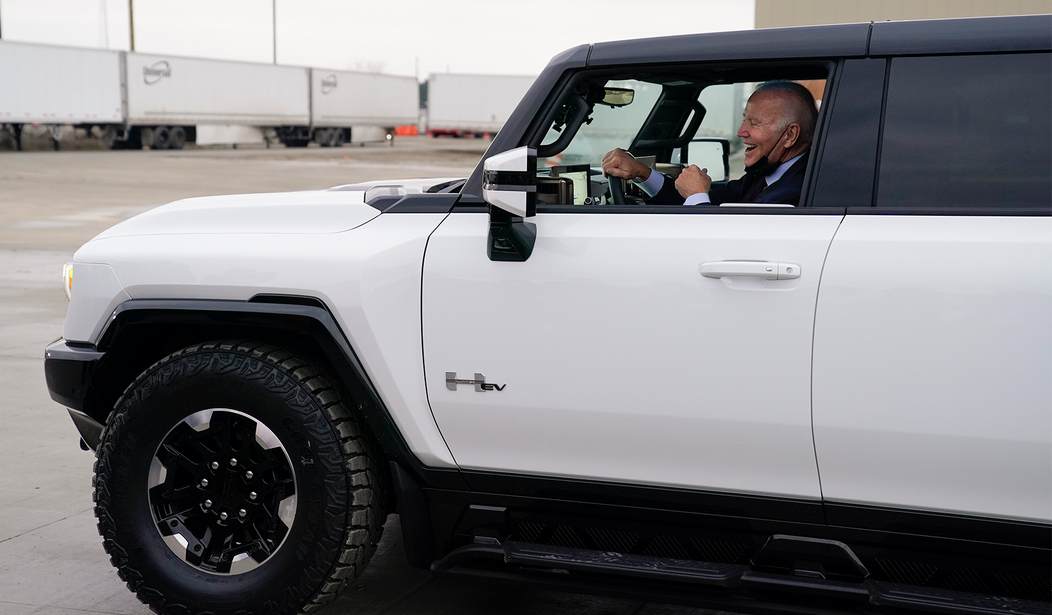Here’s the most important fact about plug-in electric vehicles (EV), courtesy of the liberal content-creators at Wikipedia in the opening sentence of their post on “Government Incentives for Plug-in Electric Vehicles:”
Such incentives “have been established around the world to support policy-driven adoption of plug-in electric vehicles. These incentives mainly take the form of purchase rebates, tax exemptions and tax credits, and additional perks that range from access to bus lanes to waivers on fees (charging, parking, tolls, etc.).” [Emphasis added]
The campaign by the Western elite in the U.S. and Europe to force everybody else to stop driving cars and trucks powered by fossil-fueled internal combustion engines and adopt EVs instead is a product of the elite’s policy choices, not ours.
No matter that hundreds of millions of Americans own and depend upon their cars and trucks to earn their livings, go where they can purchase the basic necessities of life, and visit any place they choose to go to in this vast land.
President Biden has made a regulatory policy decision that half of all vehicles sold in America will be EVs by 2030. He is spending billions of tax dollars to install half a million EV charging stations around the country to serve the anticipated explosion in demand for electric “refills.”
And federal tax credits are available to help obscure the fact that EVs remain extremely costly for consumers and offer unproven maintenance and reliability records. No wonder that, despite the immense pressure being put upon consumers to buy EVs, they still only make up about seven percent of all new-vehicle purchases.
The fact that Ford, GM, Toyota, Honda, and the rest of the world’s automakers are rushing to offer EVs throughout their model lineups is a response to the government, not consumers.
In other words, the elites in government, media, academia, woke corporations, entertainment, and non-profit advocacy communities are doing everything they can to sell EVs, but the vast majority of Americans aren’t buying. That’s the first of three huge reasons EVs will never dominate American roads.
The second reason is seen in a recent analysis by John Eichberger, executive director of the Fuels Institute, a research group backed by a coalition of energy and transportation firms.
Eichberger told me in an email:
The decision by several governments to mandate all vehicles sold by 2035 be “zero emissions vehicles” got me thinking – how would such a decision affect the United States.
Disclaimer for the nerds like me: Unlike the Fuels Institute reports that you may be familiar with, this is not an exhaustive analysis – it does not consider how or should or buts – and it is not a forecast. It assumes the planets align and all works out to achieve 100 percent of sales in 2035 are ZEV.
Assuming average vehicle sales and scrappage rates and an average annual increase rate in ZEV sales to achieve 100 percent market share, a 2035 ZEV mandate could convert 16.5 percent of the fleet by 2035 and 60 percent by 2050. This means 83.5 percent of vehicles in operation in 2035 will be primarily powered by liquid fuels.
Think about that. Even under an optimistic scenario of achieving a 100% market share of annual vehicle sales in 12 years, less than one-fifth of the nation’s overall vehicle fleet will be EVs. That means more than 83% of all the cars and trucks on the road will still require gasoline or diesel.
When I asked Eichberger about the Biden schedule, he responded, saying he “did do a 50 percent of sales by 2030 achievement and kept ZEV sales growth constant beyond that date. Results in 6.6 percent fleet conversion by 2030, 100 percent sales by 2035, and 21 percent fleet conversion by 2035.”
Put another way, elected officials and bureaucrats who think they can simply wave their regulatory magic wands to achieve their policy aims might as well order the sun and moon to reverse their courses.
Related: The Dark Side of Green: Indonesia’s ‘Tainted City’ Is Killing Workers
And that brings us to the third huge reason EVs will never dominate American roads: A study recently published by an environmental advocacy group, the Climate +Community Project. According to the study’s authors:
A crucial aspect of electrified transportation is new demand for metals, and specifically the most non-replaceable metal for EV batteries– Lithium. If today’s demand for EVs is projected to 2050, the lithium requirements of the US EV market alone in 2050 would require triple the amount of lithium currently produced for the entire global market. This boom in demand would be met by the expansion of mining. [Emphasis added]
Large-scale mining entails social and environmental harm, in many cases irreversibly damaging landscapes without the consent of affected communities. As societies undertake the urgent and transformative task of building new, zero-emissions energy systems, some level of mining is necessary. But the volume of extraction is not a given. Neither is where mining takes place, who bears the social and environmental burdens, or how mining is governed.
To their credit, the researchers acknowledge the reality that exploding demand for the batteries that power EVs will require an exponential increase in mining the lithium those batteries require. That increased mining activity will result in much greater environmental damage if lithium demand is not curbed.
But check out the researchers’ recommended approach to limiting lithium demand:
This report finds that the United States can achieve zero emissions transportation while limiting the amount of lithium mining necessary by reducing the car dependence of the transportation system, decreasing the size of electric vehicle batteries, and maximizing lithium recycling.
Reordering the US transportation system through policy and spending shifts to prioritize public and active transit while reducing car dependency can also ensure transit equity, protect ecosystems, respect Indigenous rights, and meet the demands of global justice.
Note there is not a word about consumer choice in that prescription. The desired end of researchers is to be achieved through the use of government force — AKA “federal regulation” — to make all of us non-elitists toe the elite line.
In other words, just so the elitists can pursue their EV policy goals, everybody else will have to all but give up the vast freedoms afforded every American with a car or truck to go where they please when they please. Reducing “car dependence” means all but ending private ownership of cars and trucks.










Join the conversation as a VIP Member